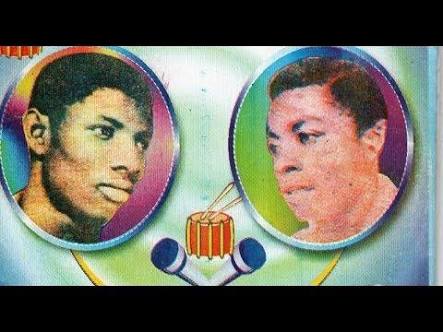
It is grief that we have received the news of the passing away of a great Urhobo music icon, Sir Juju Debala of Aladja.
Sir Juju, you have done your part, left your mark and made us proud. Sail safely to the other side of the River as you enter the abode of the ancestors.
.
Obuile r’Ode, Akpo k’Edefa!
May his soul rest in peace.
Friday, the greatest shock of the century hit the Urhobo nation. One of its finest musical maestro paid homage to the ancestral world.
Sir Juju Debala as he was fondly called by all, was the very first Urhobo artiste to have performed in England in 1948.
SIR JUJU DEBALA: A BRIEF PROFILE (By Prof G.G. Darah & Peter Omoko)
Sir Juju Onojefe Debala is a complex of a miracle, an enigma and dilemma tale. He is similar to the tale of the handicapped child who grows up to be a genius and prodigy. Born blind, deaf and lame, he has emerged as one of the most eloquent and celebrated composer-singer-performers of Africa in the 20th century. Musicologists rank him along with Fela Anikulapo-Kuti of Nigeria and Miriam Makeba of South Africa. From 1965 to 2012, Sir Juju’s musical groups produced over 100 audio-tape cassettes and CDs. He has had more than 2,500 live performances on the average of 50 per year. The group has entertained at spectacular events in Lagos, Ibadan, Ile-Ife, Okitipupa, Port Harcourt, Benin, Ughelli, with hundreds of appearances in the Warri-Effurun metropolis and environs. The name “Juju” derived from the inauspicious conditions of his childhood. For several years he could neither stand up nor walk.
Baffled by this “spirit” child, his father, Ocheria Debala, took him one day in a boat from Aladja to Warri and dumped him at the feet of the great medicine man, Mokunghegbe of Iyara Quarters. On sighting the child, the notable Urhobo healer exclaimed: “OnanaEdjo” meaning “Juju” to express his sense of wonder. The Iyara herbal doctor cured the child of his ailments; he started to see, to talk and, at last, to walk. The name Juju stuck to him thereafter and for good. Sir Juju is the prodigy of his father, Debala, who was one of the first Urhobo musicians to travel to England in 1948 to produce the record, “Sokolobia”. Sir Juju formed his juvenile Adjuya group at the age 13 in 1963. He later joined with Udjabo Okololo, also of Aladja, to establish the “Fashione” genre of popular music for which they are known. Juju and Udjabo are the most elegant duets in contemporary Urhobo musical experience. Udjabo passed away in 1997. About 3,000 lines of the songs have been transcribed and translated. Among the bestseller albums are
Motumolo, Ededon, Indian, Ikoriko, Abamwa, Eduba, Bidofo, Enavwose, Mariere: the Midwest Nationalist, and Ubido: Epic of the Brave and Just. The romantic and love numbers of all time include No Apprentice in Enjoyment; Ogo Me Biko or Ode to a Stubborn In-Law; Rose: My Darling; and Margaret: My Sweet Heart. The sobriquet “Sir” was added to his name by Mr Bricks, the Managing Director of Philips West African Studios in Lagos to distinguish him from Yoruba juju musicians. The group also produced for Emi Studios, Electromat, Decca Studios, Palofon Studios all in Lagos and Iyanda Studio in Ibadan. Their notable contemporaries include Omokomoko Osokpa, Ogute Ottan, J.C. Ogbiniki, Johnson Adjan, OkpanArhibo, America Djalere, Lucky Okwe, Nathaniel Oruma, and Lady Rose Okiriguo.
Download his video below








All Comments